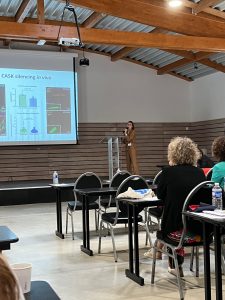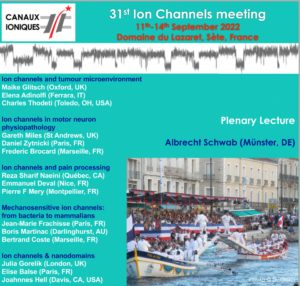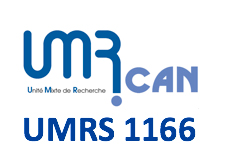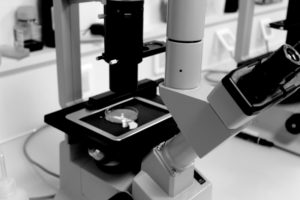 Camille BLANDIN, PhD Student, UMRS 1166 – Team 3 Elise Balse
Camille BLANDIN, PhD Student, UMRS 1166 – Team 3 Elise Balse
CASK is a key organizer of cardiomyocyte electrical and structural polarity.
Abstract: Although the organization of the cardiomyocyte membrane into functional microdomains directly influences the anisotropic propagation of the action potential, the mechanisms underlying the rod-like structural organization of cardiomyocytes during post-natal development are poorly understood. We have previously shown in the adult cardiomyocyte that CASK regulates sodium channel expression at the lateral membrane in interaction with focal adhesion complexes. In addition, preliminary results have shown that the expression level of CASK evolves during postnatal development.
CASK viral constructs were designed to inhibit the expression of CASK in both neonatal cardiomyocytes, in vitro (Ad-shCASK) and in vivo (AAV-shCASK). Proteomic analysis showed that CASK invalidation strongly modify immature cardiomyocyte proteome, notably the acting cytoskeleton signaling. Immunostaining experiments on neonatal cardiomyocytes confirmed that CASK is required for the correct organization of the cytoskeleton and impacted both mechanical and electrical junction formation of the intercalated disc. Neonatal cardiomyocytes invalidated for CASK displayed abnormal contractility, focal adhesion fragility, and anoikis. Echocardiography phenotyping of CASK-invalidated rats at the neonatal stage reveals eccentric ventricular remodeling, decreased systolic performance but a preserved contractile reserve. In addition, CASK silencing was associated to QT duration modifications and increased ventricular arrhythmia incidence after myocardial infarction, combined with reduced Nav1.5/Kir2.1 expression level.
This study demonstrates that CASK, a partner of lateral membrane Nav1.5, confers the ability to orchestrate both cardiomyocyte molecular organization and tissue cohesion. CASK appears to be a key modulator in molecular arrangement of electrical and structural polarity of cardiomyocytes during postnatal development.
Keywords: CASK, myocardium, postnatal development, cell-adhesion, structural polarity.




